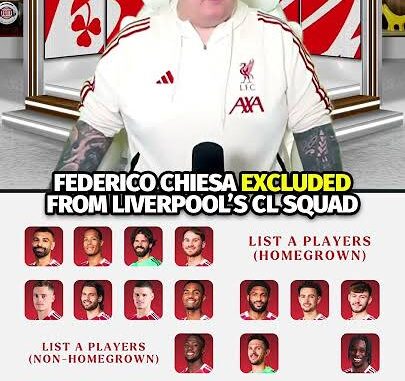
In a decision that has raised eyebrows across Europe, Liverpool have officially excluded Federico Chiesa from their UEFA Champions League squad for the 2025/26 season.
The Italian winger, who only joined the Reds this summer in a highly anticipated move from Juventus, was expected to play a central role in the club’s European campaign. Instead, his omission has fueled speculation about his fitness, tactical suitability, and even his long-term future at Anfield.
When Liverpool secured Chiesa’s signature in July, it was heralded as one of the transfer coups of the summer. The 27-year-old was brought in to add creativity, pace, and direct attacking threat to Jürgen Klopp’s forward line. Having established himself as one of Serie A’s most dynamic wingers and a Euro 2020 hero for Italy, Chiesa was seen as a natural fit for Liverpool’s high-intensity system. His arrival was also framed as part of Liverpool’s broader plan to refresh their aging attack and reassert themselves among Europe’s elite.
That narrative, however, has taken a dramatic twist. UEFA’s official squad list confirmed that Chiesa will not feature in the group stage, meaning Liverpool will rely instead on Mohamed Salah, Darwin Núñez, Luis Díaz, Cody Gakpo, and emerging academy talent Ben Doak to carry their offensive load in Europe. The question everyone is asking is: why has Klopp made such a bold call?
Sources close to the club point primarily to fitness concerns. Chiesa has struggled with recurring muscle issues since his anterior cruciate ligament injury in early 2022. Though he has looked sharp in bursts, Liverpool’s medical staff have reportedly urged caution in managing his workloadI.
Klopp is believed to have weighed the risk of overexposing Chiesa in a demanding Champions League schedule against keeping him fit for domestic fixtures, where Liverpool aim to challenge Manchester City and Arsenal in the Premier League title race.
Another factor could be squad registration rules. UEFA’s 25-man squad limit, coupled with the requirement for homegrown players, forces managers to make difficult choices. Liverpool, boasting a deep roster this season, may have had to sacrifice a high-profile signing to comply with regulations. Players like Curtis Jones, Harvey Elliott, and Trent Alexander-Arnold automatically strengthen the homegrown quota, but foreign slots remain tight. Chiesa, unfortunately, appears to be the casualty of that balancing act.
The decision, however, has not been universally popular among supporters. Many fans had envisioned Chiesa lighting up Anfield on European nights, combining with Salah and Núñez to form a devastating front line. Instead, they must wait until at least the knockout stages—should Liverpool progress—before seeing him in continental action. On social media, some have questioned whether Klopp has been too conservative, while others sympathize with the pragmatic need to prioritize fitness and balance.
From Chiesa’s perspective, the exclusion will undoubtedly sting. For a player of his caliber and ambition, the Champions League represents the pinnacle of club football. Yet, Klopp has a reputation for carefully managing players returning from injury, often taking the long view rather than gambling in the short term. If Chiesa can regain his sharpness and consistency through domestic matches, he could still emerge as a decisive figure later in the season.
Ultimately, Liverpool’s choice to omit Chiesa underscores the challenges elite managers face when blending marquee signings with squad depth and fitness realities. It may appear shocking today, but Klopp’s track record suggests there is a long-term strategy at play. For now, Chiesa must bide his time, prove his reliability in the Premier League, and be ready when the call eventually comes to light up Europe in Liverpool red.
Be the first to comment